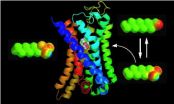(Press-News.org) Two University of Birmingham academics are calling for more research to be carried out looking at how the brains of sportspeople – including children – react when they receive a blow to the head.
Their call is echoed by Dawn Astle and Peter Robinson. Dawn Astle, is the daughter of former West Bromwich Albion player Jeff Astle who, an inquest found, died from brain trauma caused by heading heavy footballs - a condition known as Chronic Traumatic Encephalopathy (CTE). Peter Robinson is the father of Ben Robinson, whose son died as a result of repeated concussions during a rugby match.
Dr Michael Grey, from the University's School of Sport, Exercise and Rehabilitation Sciences, and Prof Tony Belli, from the School of Clinical and Experimental Medicine, are running a study to investigate the brains of sportspeople in the aftermath of a concussion – they are trying to develop a better test to aid the return to play decision.
This week (Thursday), during the British Science Festival, they will host a gathering of key researchers and clinicians across the UK at Birmingham to share research ideas which may ultimately lead to answers over the damage done by repeated head trauma in sport.
The duo want to see more being done to protect players of all ages and levels, from grassroots sport to the professionals. This includes better education programmes about how to recognise concussion and stricter adherence to return to play guidelines.
Last month, a group of parents in the USA filed a lawsuit against FIFA which pushes for rule changes around the return to play following a concussion, as well as limits on how many times children under 17 can head the ball.
Dr Grey agrees that heading the ball could have serious repercussions for children and said: "There is good evidence to suggest heading the ball in children needs to be looked at very closely. Children's brains are not fully formed, they are not as well protected as an adult and we do not fully understand the damage these repeated blows to the head are doing to these children's brains. We must have more research into this area."
Prof Belli is concerned that second impact syndrome – where a person who has had one concussion then has a second blow to the head which is magnified by the first – is not yet fully understood. He said: "The issue of second impact syndrome is not that well-known but the brain can suffer very serious damage – and the fact people are not heeding that is very worrying. We must get the message through in all sports that if a player has had a concussion, they must not play on, as the ramifications of a second blow – even if it looks minor to the observer – could be very grave indeed."
INFORMATION:
The Birmingham study is funded by the British Medical Association and is part of the NIHR Surgical Reconstruction and Microbiology Research Centre - a national centre for trauma research which takes discoveries from the military frontline to improve outcomes for all patients in the UK.
More needed to protect our sportspeople from brain injury, say Birmingham experts
2014-09-11
ELSE PRESS RELEASES FROM THIS DATE:
The Lancet Diabetes & Endocrinology: 1 in 4 people with diabetes worldwide live in China, but a new approach could help transform their care
2014-09-11
Diabetes has become a major public health crisis in China, with an annual projected cost of 360 billion RMB (nearly 35 billion British pounds) by 2030, but a new collaborative approach to care that uses registries and community support could help improve diabetes care, according to a new three-part Series about diabetes in China published in The Lancet Diabetes & Endocrinology.
China has the largest number of people with diabetes of any country in the world, and the disease has reached epidemic proportions in the adult population [Paper 1]. In 1980, less than 1% of Chinese ...
Study: Role of emergency contact is mistaken for advance directive
2014-09-11
DETROIT – More than 95 percent of patients treated in an Emergency Department mistake their emergency contact as the designated medical decision maker for end-of-life care, according to a new study by Henry Ford Hospital in Detroit.
The study is being presented Wednesday at the 20th International Congress on Palliative Care in Montreal.
Erin Zimny, M.D., a Henry Ford Emergency Medicine and Palliative Care physician and a study co-author, attributes the misunderstanding to health care practitioners routinely asking patients for their emergency contact information without ...
Genomic analysis reveals that a high-risk leukemia subtype becomes more common with age
2014-09-11
More than one-quarter of young adults with the most common form of acute lymphoblastic leukemia (ALL) have a high-risk subtype with a poor prognosis and may benefit from drugs widely used to treat other types of leukemia that are more common in adults, according to multi-institutional research led by St. Jude Children's Research Hospital investigators. The study appears in the current issue of The New England Journal of Medicine.
ALL is the most common childhood cancer. The research focused on a subtype of ALL known as Philadelphia chromosome-like ALL (Ph-like ALL). In ...
Chemists discover way nose perceives common class of odors
2014-09-11
Biologists claim that humans can perceive and distinguish a trillion different odors, but little is known about the underlying chemical processes involved. Biochemists at The City College of New York have found an unexpected chemical strategy employed by the mammalian nose to detect chemicals known as aldehydes.
According to a team led by CCNY Associate Professor of Chemistry Kevin Ryan and Columbia biologist Stuart Firestein, some of the nose's many aldehyde receptors don't detect the aldehyde by its structure and shape directly. Rather, the aldehyde is recognized by ...
Small weight gain can raise blood pressure in healthy adults
2014-09-10
Gaining just five pounds can increase your blood pressure, according to a study presented at the American Heart Association's High Blood Pressure Research Scientific Sessions 2014.
Many people understand the health dangers of large amounts of extra body weight, but reasearchers in this study wanted to see the impact of a small weight gain of about five to 11 pounds.
"To our knowledge, for the first time, we showed that the blood pressure increase was specifically related to increases in abdominal visceral fat, which is the fat inside the abdomen," said Naima ...
Using plants to produce enzyme may provide treatment for high blood pressure in lungs
2014-09-10
Using plant leaves to produce and deliver a key enzyme may improve treatment for life-threatening high blood pressure in the lungs, according to a study presented at the American Heart Association's High Blood Pressure Research Scientific Sessions 2014.
"Current therapies for pulmonary hypertension don't cure the underlying disorder and the long-term prognosis is poor, even with treatment," said Vinayak Shenoy, Ph.D., the study's lead author and an assistant research scientist at the University of Florida in Gainesville. "There is an urgent need to discover potential ...
Restricting calories may improve sleep apnea, blood pressure in obese people
2014-09-10
— Restricting calories may improve obstructive sleep apnea and reduce high blood pressure in obese adults, according to a study presented at the American Heart Association's High Blood Pressure Research Scientific Sessions 2014.
People with sleep apnea may experience pauses in breathing five to 30 times per hour or more while sleeping. It prevents restful sleep and is associated with high blood pressure, arrhythmia (abnormal heart rhythm), stroke and heart failure.
In a 16-week ramdomized clinical trial, researchers analyzed 21 obese people 20-55 years old with a history ...
Can your blood type affect your memory?
2014-09-10
MINNEAPOLIS – People with blood type AB may be more likely to develop memory loss in later years than people with other blood types, according to a study published in the September 10, 2014, online issue of Neurology®, the medical journal of the American Academy of Neurology.
AB is the least common blood type, found in about 4 percent of the U.S. population. The study found that people with AB blood were 82 percent more likely to develop the thinking and memory problems that can lead to dementia than people with other blood types. Previous studies have shown that people ...
Angling chromium to let oxygen through
2014-09-10
RICHLAND, Wash. -- Researchers have been trying to increase the efficiency of solid oxide fuel cells by lowering the temperatures at which they run. More efficient fuel cells might gain wider use in vehicles or as quiet, pollution-free, neighborhood electricity generating stations. A serendipitous finding has resulted in a semiconducting material that could enable fuel cells to operate at temperatures two-thirds lower than current technology, scientists reported August 18 in Nature Communications.
In an attempt to create a metal oxide with the properties of metal, researchers ...
Association between sunshine and suicide examined in study
2014-09-10
Lower rates of suicide are associated with more daily sunshine in the prior 14 to 60 days.
Light interacts with brain serotonin systems and possibly influences serotonin-related behaviors. Those behaviors, such as mood and impulsiveness, can play a role in suicide.
The authors examined the relationship between suicide and the duration of sunshine after mathematically removing seasonal variations in sunshine and suicide numbers. They analyzed data on 69,462 officially confirmed suicides in Austria between January 1970 and May 2010. Hours of sunshine per day were ...


